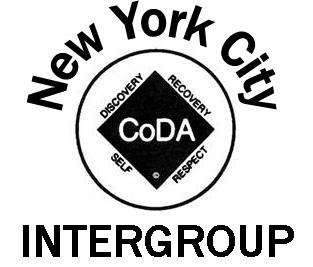 |
A Twelve Step self-help program for Co-Dependents |
| Click on a Step below to see the readings and exercises for that Step. Step 1 Step 2 Step 3 Step 4 Step 5 Step 6 Step 7 Step 8 Step 9 Step 10 Step 11 Step 12 |
CoDependents Anonymous (CoDA) in New York City This web site has been provided by NYC CoDA Intergroup Working the 12 Steps of CoDependents Anonymous (CoDA) © 2005 NYC CoDA Intergroup. All rights reserved. The CoDA 12 Steps and 12 Promises are © Co-Dependents Anonymous, Inc. The Twelve Steps and Twelve Traditions have been reprinted and adapted with permission of Alcoholics Anonymous World Services, Inc. Permission to reprint and adapt this material does not mean that AA has reviewed or approved the content of this publication, nor that AA agrees with the views expressed herein. AA is a program of recovery from alcoholism only – use of the Twelve Steps and Twelve Traditions in connection with programs and activities which are patterned after AA, but which address other problems, does not imply otherwise. Step 11 Co-Dependents Anonymous Step 11: “Sought through prayer and meditation to improve our conscious contact with God as we understood God, praying only for knowledge of God's will for us and the power to carry that out.” Co-Dependents Anonymous Promise 11: “I trust a guidance I receive from my Higher Power and come to believe in my own capabilities.” Suggested Reading CoDA Blue Book pp. 69-73. Also see the Serenity Prayer on page 11. 12 Step Handbook: Step 11 Chapter, pages 51-56. “CoDA 12 Steps & 12 Traditions Workbook – Steps 10,11,12” : Step 11 is pages 14-15. Exercises These exercises can help you work the 11th Step. Keep the task manageable; set safe boundaries for yourself. For example, set aside an amount of time that feels comfortable to you to work the Step today. If you’ve never meditated, allow yourself to start slowly at first, with perhaps no more than 5-10 minutes. Consider “book-ending” with your Step work (i.e. telling someone, or your meeting, that you plan to do something, then telling them afterwards that you did it; this can help you show up for yourself). Finally, be gentle, and remember that reading and writing about a Step are important parts of working the Steps. 1. Without editing or over-analyzing, write about “what the 11th Step means to me.” 2. Review the questions on page 15 of the “CoDA 12 Steps & 12 Traditions Workbook – Steps 10,11,12”. Use any that feel right. 3. How is this Step different from the 3rd Step? Why does it come after Steps 4 through 10? 4. How often do you have “conscious contact” with God on a given day? Can you name several times in the past week? How does it feel when you have this kind of contact? If you’re not sure, imagine how it might feel. 5. What is your immediate reaction to the words “prayer and meditation”? Do you feel skeptical? Have your feelings been affected by past experiences, or a particular belief system? If there is resistance to prayer and/or meditation, why is that? Can you allow yourself to experiment and find ways that work for you? 6. Exercise – If you’re new to meditation (or it’s not yet a regular habit), try a 5 minute meditation daily or several times this week, like Monday, Wednesday, and Friday. Try different ways of meditating: focusing on your breath, listening with all of your attention to some beautiful music, a quiet walk, using a guided meditation tape, etc. Notice what works for you. What helps you feel serene and connected? Gradually increase the time and/or frequency of meditation, as it feels safe and comfortable to do so. 7. How do you know if something is God’s will? Does God communicate in words, feelings, images, or…? 8. How much still time do you have in the day? How often is your mind still, free from chatter? Is there an inner dialogue usually running inside your head? What helps you quiet your mind? (For example nature, certain sounds, chanting, focusing on your breath, a certain prayer, etc.) How does quieting your mind improve your conscious contact with God? 9. Do you see prayer as a way of getting what you want? Why does the Step emphasize knowledge of God’s will, as opposed to your own will? How does it feel to let go of your own will and seek God’s? 10. Exercise – during a time of stress, pause. Breathe slowly. Ask, “God, what is Your will for me?” Breathe. Clear your mind. Let go…. 11. Exercise – if you’re stuck in resentment or anger, or if you think you know what’s best for someone else and you pray for some particular outcome for them, try this instead: imagine yourself surrounded by Light. Imagine the other person surrounded by Light. Breathe in slowly. Then as you let the breath out, lovingly release that person to the care of their Higher Power. Take your time. How does this feel? (For more information on praying for others, see the 12 Step Handbook, p. 55.) 12. How do you integrate your preferences and dreams with this Step? Can you dream and let go? If you want to be on our email list to receive updates on upcoming CoDA events in New York City, please write to anicko2794@yahoo.com For more CoDA info, go to www.codependentsnyc.org or call 646-289-9954 For more information on the program of CoDependents Anonymous, visit the CoDA World Fellowship web site at www.coda.org |